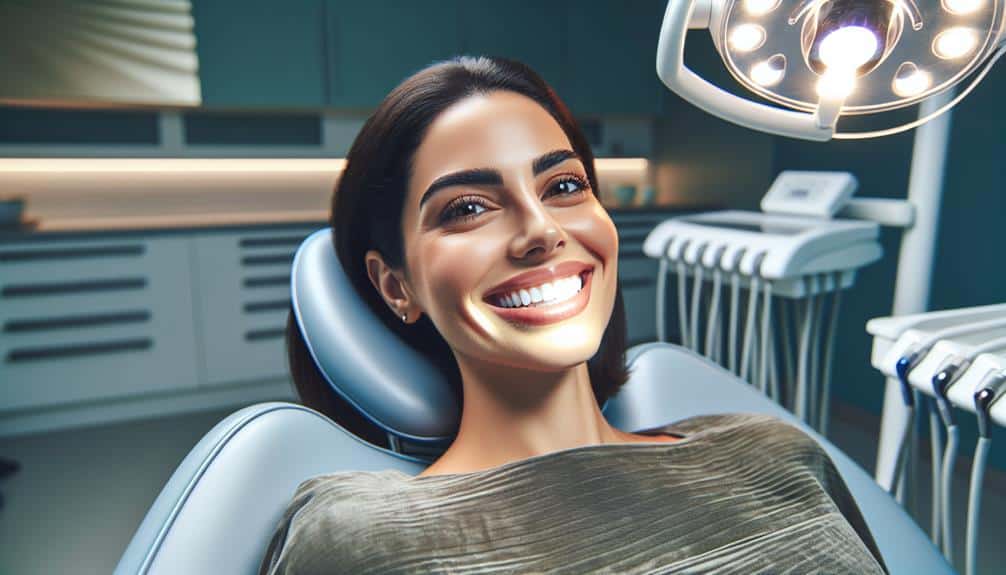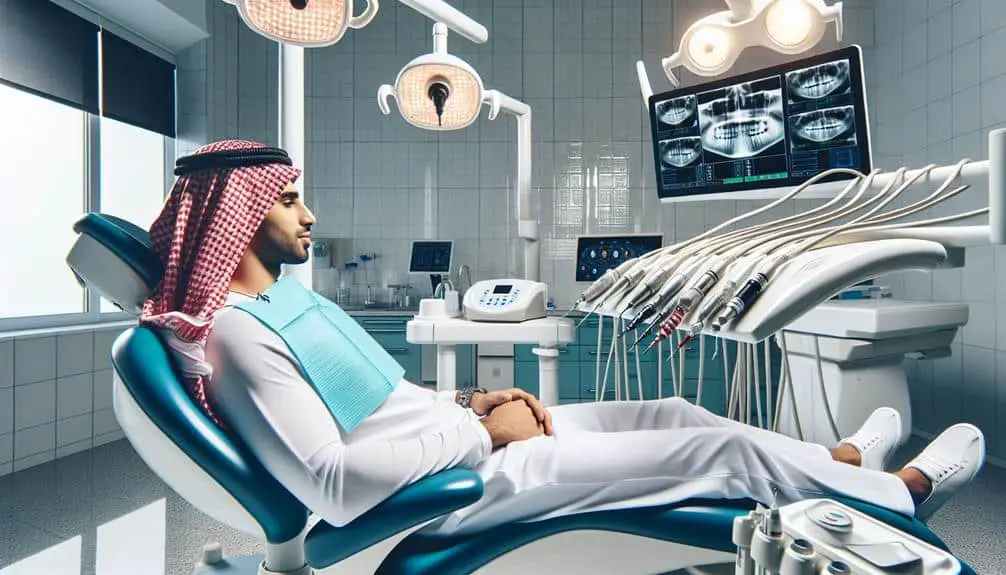For effective teeth whitening, laser treatment targets tough stains precisely and swiftly, providing a promising solution to enhance your smile. The laser technology efficiently breaks down pigmented molecules in your teeth, penetrating enamel and dentin to achieve noticeable results in just one session. With reduced sensitivity and long-lasting effects, laser whitening proves advantageous over traditional methods, offering convenience and professional supervision. If you seek lasting and efficient teeth whitening, laser treatment stands out as a promising choice for rejuvenating your smile.
Key Points
- Laser teeth whitening is highly effective for removing deep stains like tetracycline.
- Quick results are achievable in just one session with laser whitening.
- Reduced tooth sensitivity is a benefit of laser whitening compared to traditional methods.
- Long-lasting effects can be enjoyed with proper maintenance after laser whitening treatment.
- Professional supervision ensures safety and optimal results with laser whitening.
Tetracycline Stains and Teeth Whitening
When considering laser teeth whitening for tetracycline stains, it's essential to understand the potential effectiveness and limitations of this treatment method. Tetracycline discoloration is known for causing stubborn stains that are challenging to remove with traditional whitening options. Laser treatment has emerged as a promising solution for addressing these deep-set stains.
Studies have shown that laser teeth whitening can be more effective in treating tetracycline stains compared to other methods. The laser energy targets the pigmented molecules within the teeth, breaking them down and ultimately reducing the discoloration. This targeted approach is particularly beneficial for dealing with stubborn stains that haven't responded well to conventional whitening treatments.
While laser treatment offers significant advantages in tackling tetracycline discoloration, it's important to note that the effectiveness may vary depending on the severity of the stains and individual factors. Consulting with a dental professional who specializes in laser teeth whitening can provide valuable insight into whether this treatment is suitable for your specific case.
Laser Teeth Whitening Process Explained
Utilizing advanced laser technology, the process of teeth whitening involves targeting and breaking down pigmented molecules within the teeth to reduce discoloration effectively. During the procedure, a specialized whitening agent is applied to the teeth, and then a laser is used to activate the whitening agent, allowing it to penetrate the enamel and dentin of the teeth. The laser energy facilitates the breakdown of stains and discolorations, resulting in visibly whiter teeth.
This method is known for its efficiency and quick results. The laser technology used in teeth whitening procedures is considered safe when administered by trained professionals. The concentrated light energy is directed precisely at the teeth, minimizing potential damage to surrounding tissues. Additionally, the procedure is relatively comfortable for patients, with minimal sensitivity reported compared to other teeth whitening methods.
Benefits of Laser Whitening for Stained Teeth
Looking to remove stubborn stains from your teeth efficiently and safely? Laser teeth whitening offers several benefits for stained teeth that you may find appealing:
- Effective Stain Removal: Laser whitening can target deep-set stains, providing a more thorough whitening compared to traditional methods.
- Quick Results: With laser technology, you can achieve noticeably whiter teeth in just one session, making it a convenient option for those seeking immediate results.
- Reduced Sensitivity: Laser whitening often causes less tooth sensitivity compared to other whitening procedures, ensuring a more comfortable experience.
- Long-lasting Effects: The results of laser whitening can last for a significant amount of time, allowing you to enjoy your brighter smile for an extended period.
When considering the benefits of laser whitening, it's essential to weigh the cost comparison against traditional whitening methods and address any safety concerns with your dental professional to make an informed decision tailored to your needs.
Comparing Laser Whitening With Traditional Methods
To compare the effectiveness of laser teeth whitening with traditional methods, consider the various factors that distinguish these two approaches. When it comes to effectiveness, laser whitening tends to show more immediate and noticeable results compared to traditional methods such as over-the-counter whitening strips or toothpaste.
However, when it comes to cost comparison, traditional methods are generally more budget-friendly than laser treatments, which can be pricier due to the technology involved.
Regarding time commitment, laser whitening typically requires fewer sessions to achieve desired results compared to traditional methods that may need more prolonged use for noticeable effects. Additionally, laser treatments are often seen as more convenient since they're usually performed in a dental office under professional supervision, offering a quicker and tailored approach to teeth whitening.
On the other hand, traditional methods like whitening toothpaste or strips can be done at home but might require more consistency and time before visible improvements are seen.
Long-term Results and Maintenance for Tetracycline Stains
For individuals with tetracycline stains, maintaining long-term results post-teeth whitening treatments is essential for preserving a bright and uniform smile. Tetracycline stain treatment poses unique challenges due to the severity and stubborn nature of these stains. When considering long-term efficacy and maintenance after laser teeth whitening for tetracycline stains, several key points should be kept in mind:
- Regular Dental Check-ups: Scheduling routine dental visits can help monitor the effectiveness of the whitening treatment and address any potential issues promptly.
- Professional Cleanings: Regular professional cleanings by a dental hygienist can help remove surface stains and prevent the recurrence of tetracycline stains.
- At-Home Maintenance: Following a recommended oral hygiene routine at home, including brushing, flossing, and using whitening toothpaste, can aid in maintaining the results of the whitening treatment.
- Avoiding Staining Agents: Minimizing the consumption of staining agents such as coffee, tea, and tobacco can prolong the effects of the whitening treatment.
Frequently Asked Questions
Can Laser Teeth Whitening Effectively Remove Stains Caused by Smoking or Coffee Consumption?
To effectively remove stains from smoking or coffee, laser teeth whitening offers a powerful solution. Costs can vary but professional recommendations often lean towards its efficiency over DIY kits. Maintaining results requires a consistent routine.
Is Laser Teeth Whitening Suitable for Individuals With Sensitive Teeth or Gums?
If you have sensitive teeth or gums, laser teeth whitening can provide effective pain management during the procedure. However, alternative treatments like professional at-home kits or gentle whitening toothpaste might be more suitable for your needs.
How Long Does the Effect of Laser Teeth Whitening Last Compared to Traditional Whitening Methods?
To maintain a bright smile, laser teeth whitening lasts longer than traditional methods. The longevity comparison shows fewer sessions needed. However, upkeep is vital. Despite higher cost, professional recommendations favor laser for its effectiveness and efficiency in achieving desired results.
Are There Any Potential Side Effects or Risks Associated With Laser Teeth Whitening?
To guarantee safety during laser teeth whitening, adhere to all recommended precautions. Potential complications may include tooth sensitivity or gum irritation, usually mild and temporary. Long-term results can be sustained with good oral hygiene and regular dental check-ups.
Can Laser Teeth Whitening Improve the Appearance of Teeth With Discoloration From Aging or Genetics?
To improve teeth appearance from aging or genetics, laser whitening in cosmetic dentistry can be effective. Unlike at-home kits or porcelain veneers, laser treatments offer quick results with minimal risks, providing a brighter, whiter smile.



